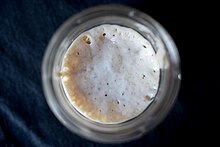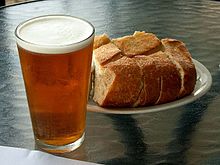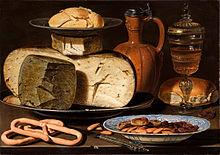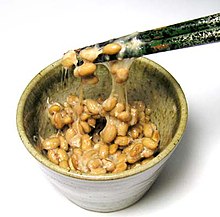Fermentation in food processing
The term "fermentation" sometimes refers specifically to the chemical conversion of sugars into ethanol, producing alcoholic drinks such as wine, beer, and cider.
However, similar processes take place in the leavening of bread (CO2 produced by yeast activity), and in the preservation of sour foods with the production of lactic acid, such as in sauerkraut and yogurt.
More localized foods prepared by fermentation may also be based on beans, grain, vegetables, fruit, honey, dairy products, and fish.
One year earlier, in 1906, ethanol fermentation studies led to the early discovery of oxidized nicotinamide adenine dinucleotide (NAD+).
[13][verification needed] Food fermentation is the conversion of sugars and other carbohydrates into alcohol or preservative organic acids and carbon dioxide.
[16] Cheonggukjang, doenjang, fermented bean curd, miso, natto, soy sauce, stinky tofu, tempeh, oncom, soybean paste, Beijing mung bean milk, kinama, iru, thua nao Amazake, beer, bread, choujiu, gamju, injera, kvass, makgeolli, murri, ogi, rejuvelac, sake, sikhye, sourdough, sowans, rice wine, malt whisky, grain whisky, idli, dosa, Bangla (drink) vodka, boza, and chicha, among others.
Kimchi, mixed pickle, sauerkraut, Indian pickle, gundruk, tursu Wine, vinegar, cider, perry, brandy, atchara, nata de coco, burong mangga, asinan, pickling, vişinată, chocolate, rakı, aragh sagi, chacha, tempoyak Mead, metheglin, tej Some kinds of cheese also, kefir, kumis (mare milk), shubat (camel milk), ayran, cultured milk products such as quark, filmjölk, crème fraîche, smetana, skyr, and yogurt Bagoong, faseekh, fish sauce, Garum, Hákarl, jeotgal, ngapi, padaek, pla ra, prahok, rakfisk, shrimp paste, surströmming, shidal Chorizo, salami, sucuk, pepperoni, nem chua, som moo, saucisson, fermented sausage Pu-erh tea, Kombucha, Lahpet, Goishicha Sterilization is an important factor to consider during the fermentation of foods.
Failing to completely remove any microbes from equipment and storing vessels may result in the multiplication of harmful organisms within the ferment, potentially increasing the risks of food borne illnesses such as botulism.
[18] "A 2009 review of the existing studies conducted across Asia concluded that regularly eating pickled vegetables roughly doubles a person's risk for esophageal squamous cell carcinoma.








